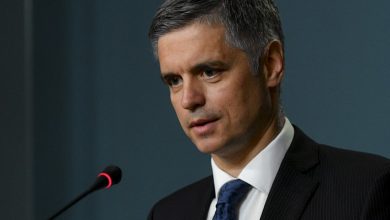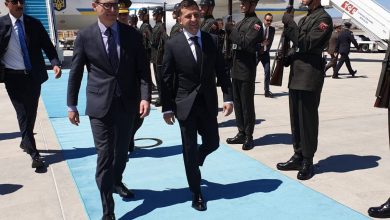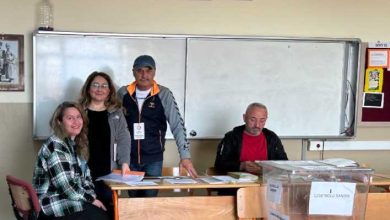Turkish asylum seekers allegedly being pushed back in small boats by Greece
Exclusive: Turkish nationals claim they were illegally put in boats by Greek authorities and returned to Turkey, where they risked persecution
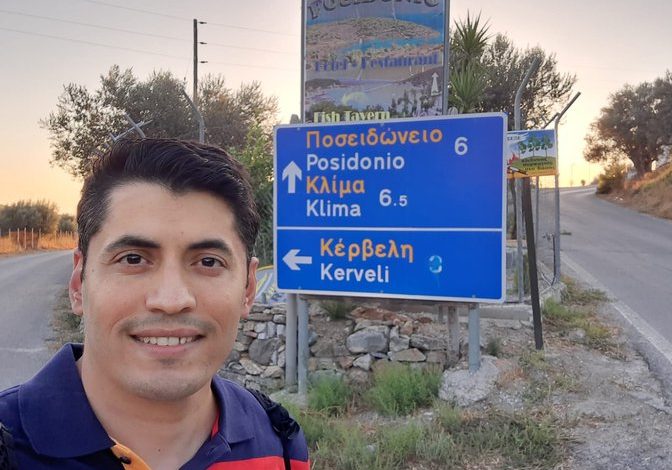
Three Turkish nationals seeking asylum in Greece in September were allegedly tortured by plain-clothes Greek officials, who then illegally put them on a boat back to Turkey,
Three Turkish nationals seeking asylum in Greece in September were allegedly tortured by plain-clothes Greek officials, who then illegally put them on a boat back to Turkey, openDemocracy can reveal.
Furkan Kurt, one of the three men, told openDemocracy that on 28 September they swam a 3.6-kilometre shortcut, with the help of a sea-scooter, from the Turkish coastal town of Kusadasi to the Greek island of Samos. They then walked 10 kilometres away from the coast, heading in the direction of the centre of the island, before being picked up by port police and illegally forced to return to Turkey, where they risked persecution.
According to Kurt, during the beatings, the Greek coast guard repeatedly asked the three men questions about how they had managed to cross the Aegean, what they had used to do so, and at which point they had started their journey. The three men refused to answer. “I reckon they beat us to punish us for being able to cross the Aegean without them knowing,” Kurt said. “They wanted to get more information about how we managed to cross and what methods we used. They were showing their teeth to prevent us from trying to cross again.”
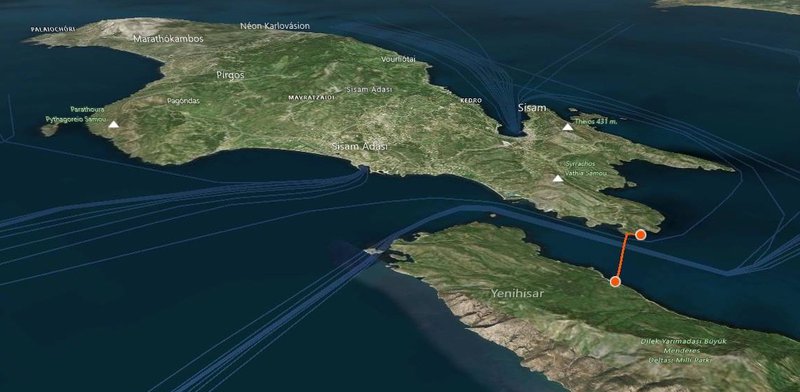
The number of Turkish refugees illegally sent back home by Greek border officials has seemingly risen dramatically amid a surge in migration that some say is fueled by President Erdogan’s crackdown on opponents.
Interviews and documents received from lawyers in Greece and Turkey, as well as from family members of victims, and victims themselves, allege that Greece carried out at least 233 illegal ‘pushbacks’ of Turkish nationals since May 2021 alone, compared to 98 push-backs tracked in 2019.
All of those pushback victims fleeing persecution in Turkey made it to Greece by crossing the land or sea border. They shared their locations with lawyers or family members via messaging apps, or sent pictures and videos of themselves in Greece, in a bid to prove that they have arrived on Greek territory and to avoid being returned to Turkey.
However, Greek border units pushed them back to Turkey, where dozens were subsequently caught by Turkish security officers and arrested.
At least 76 of those pushed back were arrested by Ankara over trumped-up terrorism charges as part of a crackdown targeting Turkish and Kurdish dissidents in the country.
Pushing refugees back to countries they fled from is illegal under the international law of non-refoulement, the principle that forbids a country from forcing refugees or asylum seekers to return to a country in which they are liable to be subjected to persecution. Athens has continually denied allegations about its use of this practice.
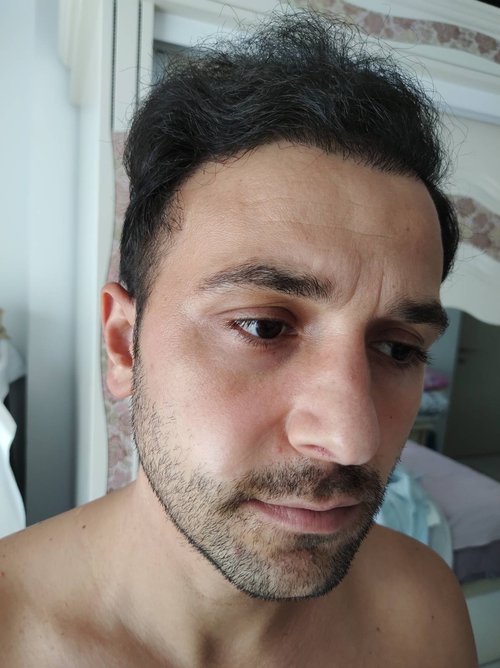
Visual material, including photographs that allegedly show injuries inflicted during torture by Greek authorities and a testimonial from one of the men, is set to challenge this denial. According to Anthimos Sideris, a Greek lawyer following the case of the group: “This will be serious evidence to help launch an investigation into the illegal pushback actions that are apparently being committed by some members of the Greek coast guard.”
“A police car on Samos stopped and checked our IDs but then left us,” Kurt told openDemocracy, “Just five minutes later, a civilian car pulled up with two men who were in plain clothing but with pistols. One of them told us they were port guards and showed us his military ID card. They then took us in their car, drove us to the port where they violently forced us onto the boat.”
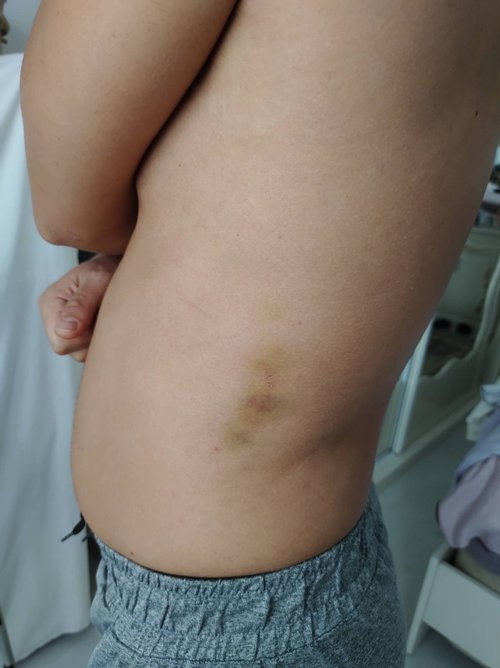
Videos filmed by the men show they had arrived in the east Samos town of Posidonio in the morning before they were picked up. Another video, filmed two hours later, reveals the number plate of the Greek police car and the faces of the officers interacting with the men before the arrival of the two plain-clothed officers who allegedly took them to the port and put them on a coastguard boat, which was driven for an hour back into Turkish waters. The men were then forced out of the coastguard boat and into a much smaller plastic boat on their own.
Kurt added: “Both men stepped on to the boat with us, one of them forced us to lie face down on the deck and then kicked and punched us on our ribs and genitals. It was very cold and the wind was freezing as they continued to beat us. There is no problem for me to identify the men who did this to us. But I didn’t expect to receive such inhumane treatment in the European Union.”
Turkish local media footage shows the three men, who were allegedly left in Turkish waters by the Greek authorities, drifting in the small plastic boat before being detained by Turkish coastguards.
Sideris, the Greek lawyer working on the men’s case, said that Samos police denied any knowledge of the three men on the island when he contacted them. The Greek police and Ministry of Migration and Asylum did not respond to a request for comment.
Arriving back in Turkey
Of the three men, only Kurt, a 35-year-old dismissed Turkish soldier, was released from Turkish police custody the day after the pushback because a local court had previously acquitted him of being a member of the Gülen movement, a group Ankara accuses of being a terrorist organisation and of masterminding the failed 2016 Turkish coup. A prosecutor objected to the acquittal, however, and Kurt is awaiting a higher court’s decision.
Despite the local court’s acquittal, Kurt can’t live freely in Turkey. He is not allowed to leave Istanbul and has to sign in at a police station every week. If a higher court reverts his acquittal, he will be sentenced to at least six years and three months in jail. Thousands of Turkish nationals in the same position as Kurt have successfully had asylum applications accepted by the EU on the basis that there are no free trials in Turkey.
Even without the prosecutor’s objection, Kurt said he had little to return to following his acquittal: “I was fired from my job even though I am innocent. Despite the acquittal from a local court, my case is still going on in a higher court after a prosecutor objected to the decision.
“The court put a travel ban on me three years ago and I have had no freedom of movement. I had no choice but to leave Turkey because the demonisation was so bad it left me socially dead.”
The other two men who were pushed back with Kurt, Elvan Güzelkücük and Oguzhan Yatar, were immediately given Turkish prison sentences of six years and three months over allegations that they are members of the Gülen movement. They deny being members of Gülen or any organisation involved in terrorism.
Speaking with openDemocracy via Skype from Germany, Güzelkücük’s German wife, Muteber, explained why she and her husband had made the decision to leave Turkey in September. “The situation meant he was now demonised and discriminated against by society, and couldn’t live freely. He couldn’t find a job to survive and we decided we should move to Germany and apply for family reunification.”
Muteber said her German citizen status meant that Güzelkücük was granted German residency in September 2021, however a travel ban imposed on him by Ankara meant he could not legally leave Turkey. This left Güzelkücük with little choice but to attempt to reach Greece by crossing the Aegean Sea, Muteber said, so that he could fly to Germany and secure his residency.
Since 2016, tens of thousands of Turkish nationals like Güzelkücük have made it to the EU by crossing land or sea borders and applying for asylum. According to Germany’s agency for migration and refugees (BAMF), in 2019 Turkish asylum seekers were the third-most registered group, after Syrians and Iraqis.
Muteber added that when Güzelkücük spoke with her from prison after being pushed back to Turkey and arrested, he told her the Greek coast guard beat them so badly that he was “grateful to be alive, because we could have died in the Aegean”.
Since the failed 2016 coup, at least 600,000 people have been prosecuted over terrorism charges, and more than 1.5 million investigated, Turkish Justice Ministry announced earlier this year. Critics claim that Erdogan has “long used the coup to consolidate his grip on power”, with a 2020 Human Rights Watch report, finding that “terrorism charges continue to be widely misused”
Speaking to openDemocracy, Dr Lena Karamanidou of Glasgow Caledonian University, who has carried out field studies of pushbacks from Greece to Turkey, said: “Our research suggests that pushbacks have been taking place in the area for decades – and according to an earlier testimony of someone who did his military service there, pushbacks of Kurdish people go back as far as the late Eighties.”
Normalised practice
“As if we were war criminals, masked [Greek] soldiers queued us up and beat us with batons, then bundled us into a military lorry and drove us to Evros. [The river that separates Greece and Turkey.]
“I was shocked at how they behaved like human traffickers. When we got there, we were lined up in two rows with hands behind our necks, then marched to the river and forced on to a boat back to Turkey.”
This testimonial by Kurdish refugee Orhan Topalan is another one in a long list of similar stories. Topalan becomes just another statistic, albeit a fortunate one, who, unlike scores of other Turkish citizens allegedly pushed back from Greece, got lucky on his second attempt at crossing to Greece, and managed to reach Switzerland.
Topalan, a former chemical engineering student, was expelled from his studies and imprisoned for two and a half years on ‘terrorism’ charges because of his engagement with political activities of the pro-Kurdish Peoples’ Democratic Party (HDP).
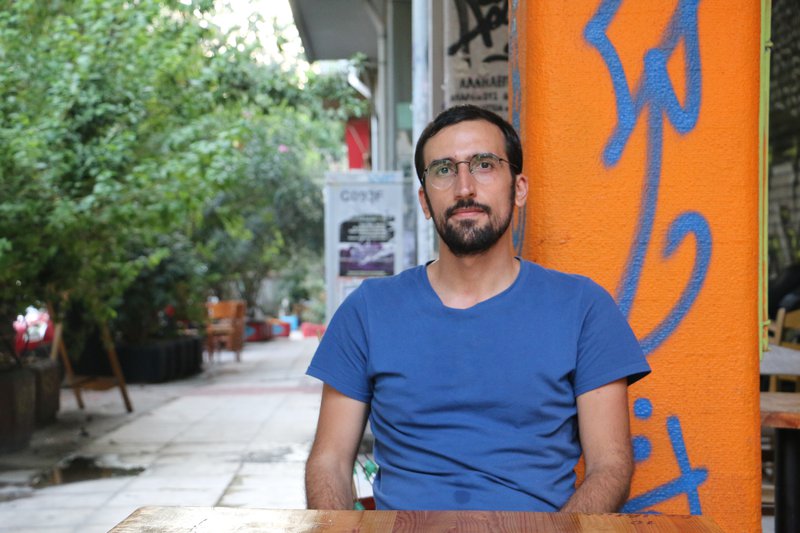
HDP is the second-largest opposition group in the Turkish parliament and its supporters are often targeted with accusations of terrorism. Turkish authorities have so far detained 17,000 HDP supporters and arrested 7,000 over the past six years, according to HDP MP Hasan Özgüneş.
For Topalan, 34, there was no option to stay in Turkey after his 2013 release pending trial and 2016 conviction, which followed. He said life in hiding from the police after his conviction led him to make his first attempt at leaving Turkey for Greece on 17 June 2020, from where he hoped to travel on to western Europe.
He said: “Within five minutes of arriving, Greek soldiers surrounded me like an enemy, forced me to kneel with their guns pointing at me. I explained I was a political asylum seeker escaping persecution in Turkey but they just shouted at me: ‘Get lost, why did you come here?’”
When openDemocracy interviewed Topalan in Athens last August, he had made it to Greece again, and had this time managed to apply for asylum in Europe. Two months after our conversation, Topalan was granted a safe haven in Switzerland.
Of his first attempt to reach Greece, he said: “It shocked me to face violence in Greece – a part of the EU, which we see as the motherland of democracy. But here I was in the EU, witnessing the violation of my human rights as an asylum seeker.” He said the soldiers had taken his laptop, e-book, phone and personal belongings before throwing him into a cell, without food or water, along with 60 others including Afghans, Pakistanis and Syrians, claiming: “They beat those guys even worse.”
He added: “I explained to a police officer that I was aware of Erdogan’s policy to use refugees as a weapon to put pressure on the EU, but he made it obvious we would all be sent back to Turkey.” On arriving back in Turkey following the pushback, Topalan said he hid from Turkish security forces and crossed the river back to Greece a few weeks later. “By hiding from the border units while walking, I finally made it to Orestiada where I went to a police station with a lawyer and applied for asylum.”
Klotildi Prountzou, a lawyer for the Greek Council for Refugees, told openDemocracy that she had contacted police authorities in Evros to register Topalan’s asylum application but was told “there wasn’t any detained person with this name”. She added such incidents are not uncommon and that Greek authorities often fail to disclose details of asylum seekers like Topalan when they are requested by lawyers and human rights organisations attempting to track them.
Karamanidou said that despite violating international law, pushbacks are becoming a “normalised” practice at European borders. As British home secretary Priti Patel has already confirmed, the UK is also planning to emulate ‘Greek-style clampdowns’ as part of its border control strategy on the Channel. Of the UK’s plans, Karamanidou said: “A decades-long routine of pushbacks on the Greek-Turkish land border also contributes to this.”
She said the real question is why the Greek government, the EU and other actors, such as Frontex, the European Border and Coast Guard Agency, are denying existing proof of pushbacks taking place.
According to Adriana Tidona, European migration researcher at Amnesty International, the EU is showing “complacency” towards pushbacks in Greece. She said EU agency Frontex “has its biggest contingent of officers deployed in Greece, irrespective of the consistent reports of pushbacks and serious human rights violations.” She said this complacency was also shown in 2020, when EU chief Ursula von der Leyen “labelled Greece as Europe’s ‘shield’ at a time when the country was committing pushbacks and other abuses at Evros”.
Tidona added: “The EU struggles to reconcile its human rights commitments with its role in Greek border control” and despite its recent renewal of demands to monitor abuses on the Greek border “more should be done to ensure Greece restores compliance with human rights law”.
can reveal.
Furkan Kurt, one of the three men, told openDemocracy that on 28 September they swam a 3.6-kilometre shortcut, with the help of a sea-scooter, from the Turkish coastal town of Kusadasi to the Greek island of Samos. They then walked 10 kilometres away from the coast, heading in the direction of the centre of the island, before being picked up by port police and illegally forced to return to Turkey, where they risked persecution.
According to Kurt, during the beatings, the Greek coast guard repeatedly asked the three men questions about how they had managed to cross the Aegean, what they had used to do so, and at which point they had started their journey. The three men refused to answer. “I reckon they beat us to punish us for being able to cross the Aegean without them knowing,” Kurt said. “They wanted to get more information about how we managed to cross and what methods we used. They were showing their teeth to prevent us from trying to cross again.”

The number of Turkish refugees illegally sent back home by Greek border officials has seemingly risen dramatically amid a surge in migration that some say is fueled by President Erdogan’s crackdown on opponents.
Interviews and documents received from lawyers in Greece and Turkey, as well as from family members of victims, and victims themselves, allege that Greece carried out at least 233 illegal ‘pushbacks’ of Turkish nationals since May 2021 alone, compared to 98 push-backs tracked in 2019.
All of those pushback victims fleeing persecution in Turkey made it to Greece by crossing the land or sea border. They shared their locations with lawyers or family members via messaging apps, or sent pictures and videos of themselves in Greece, in a bid to prove that they have arrived on Greek territory and to avoid being returned to Turkey.|
However, Greek border units pushed them back to Turkey, where dozens were subsequently caught by Turkish security officers and arrested.
At least 76 of those pushed back were arrested by Ankara over trumped-up terrorism charges as part of a crackdown targeting Turkish and Kurdish dissidents in the country.
Pushing refugees back to countries they fled from is illegal under the international law of non-refoulement, the principle that forbids a country from forcing refugees or asylum seekers to return to a country in which they are liable to be subjected to persecution. Athens has continually denied allegations about its use of this practice.

Visual material, including photographs that allegedly show injuries inflicted during torture by Greek authorities and a testimonial from one of the men, is set to challenge this denial. According to Anthimos Sideris, a Greek lawyer following the case of the group: “This will be serious evidence to help launch an investigation into the illegal pushback actions that are apparently being committed by some members of the Greek coast guard.”
“A police car on Samos stopped and checked our IDs but then left us,” Kurt told openDemocracy, “Just five minutes later, a civilian car pulled up with two men who were in plain clothing but with pistols. One of them told us they were port guards and showed us his military ID card. They then took us in their car, drove us to the port where they violently forced us onto the boat.”

Videos filmed by the men show they had arrived in the east Samos town of Posidonio in the morning before they were picked up. Another video, filmed two hours later, reveals the number plate of the Greek police car and the faces of the officers interacting with the men before the arrival of the two plain-clothed officers who allegedly took them to the port and put them on a coastguard boat, which was driven for an hour back into Turkish waters. The men were then forced out of the coastguard boat and into a much smaller plastic boat on their own.
Kurt added: “Both men stepped on to the boat with us, one of them forced us to lie face down on the deck and then kicked and punched us on our ribs and genitals. It was very cold and the wind was freezing as they continued to beat us. There is no problem for me to identify the men who did this to us. But I didn’t expect to receive such inhumane treatment in the European Union.”
Turkish local media footage shows the three men, who were allegedly left in Turkish waters by the Greek authorities, drifting in the small plastic boat before being detained by Turkish coastguards.
Sideris, the Greek lawyer working on the men’s case, said that Samos police denied any knowledge of the three men on the island when he contacted them. The Greek police and Ministry of Migration and Asylum did not respond to a request for comment.
Arriving back in Turkey
Of the three men, only Kurt, a 35-year-old dismissed Turkish soldier, was released from Turkish police custody the day after the pushback because a local court had previously acquitted him of being a member of the Gülen movement, a group Ankara accuses of being a terrorist organisation and of masterminding the failed 2016 Turkish coup. A prosecutor objected to the acquittal, however, and Kurt is awaiting a higher court’s decision.
Despite the local court’s acquittal, Kurt can’t live freely in Turkey. He is not allowed to leave Istanbul and has to sign in at a police station every week. If a higher court reverts his acquittal, he will be sentenced to at least six years and three months in jail. Thousands of Turkish nationals in the same position as Kurt have successfully had asylum applications accepted by the EU on the basis that there are no free trials in Turkey.
Even without the prosecutor’s objection, Kurt said he had little to return to following his acquittal: “I was fired from my job even though I am innocent. Despite the acquittal from a local court, my case is still going on in a higher court after a prosecutor objected to the decision.
“The court put a travel ban on me three years ago and I have had no freedom of movement. I had no choice but to leave Turkey because the demonisation was so bad it left me socially dead.”
The other two men who were pushed back with Kurt, Elvan Güzelkücük and Oguzhan Yatar, were immediately given Turkish prison sentences of six years and three months over allegations that they are members of the Gülen movement. They deny being members of Gülen or any organisation involved in terrorism.
Speaking with openDemocracy via Skype from Germany, Güzelkücük’s German wife, Muteber, explained why she and her husband had made the decision to leave Turkey in September. “The situation meant he was now demonised and discriminated against by society, and couldn’t live freely. He couldn’t find a job to survive and we decided we should move to Germany and apply for family reunification.”
Muteber said her German citizen status meant that Güzelkücük was granted German residency in September 2021, however a travel ban imposed on him by Ankara meant he could not legally leave Turkey. This left Güzelkücük with little choice but to attempt to reach Greece by crossing the Aegean Sea, Muteber said, so that he could fly to Germany and secure his residency.
Since 2016, tens of thousands of Turkish nationals like Güzelkücük have made it to the EU by crossing land or sea borders and applying for asylum. According to Germany’s agency for migration and refugees (BAMF), in 2019 Turkish asylum seekers were the third-most registered group, after Syrians and Iraqis.
Muteber added that when Güzelkücük spoke with her from prison after being pushed back to Turkey and arrested, he told her the Greek coast guard beat them so badly that he was “grateful to be alive, because we could have died in the Aegean”.
Since the failed 2016 coup, at least 600,000 people have been prosecuted over terrorism charges, and more than 1.5 million investigated, Turkish Justice Ministry announced earlier this year. Critics claim that Erdogan has “long used the coup to consolidate his grip on power”, with a 2020 Human Rights Watch report, finding that “terrorism charges continue to be widely misused”
Speaking to openDemocracy, Dr Lena Karamanidou of Glasgow Caledonian University, who has carried out field studies of pushbacks from Greece to Turkey, said: “Our research suggests that pushbacks have been taking place in the area for decades – and according to an earlier testimony of someone who did his military service there, pushbacks of Kurdish people go back as far as the late Eighties.”
Normalised practice
“As if we were war criminals, masked [Greek] soldiers queued us up and beat us with batons, then bundled us into a military lorry and drove us to Evros. [The river that separates Greece and Turkey.]
“I was shocked at how they behaved like human traffickers. When we got there, we were lined up in two rows with hands behind our necks, then marched to the river and forced on to a boat back to Turkey.”
This testimonial by Kurdish refugee Orhan Topalan is another one in a long list of similar stories. Topalan becomes just another statistic, albeit a fortunate one, who, unlike scores of other Turkish citizens allegedly pushed back from Greece, got lucky on his second attempt at crossing to Greece, and managed to reach Switzerland.
Topalan, a former chemical engineering student, was expelled from his studies and imprisoned for two and a half years on ‘terrorism’ charges because of his engagement with political activities of the pro-Kurdish Peoples’ Democratic Party (HDP).

HDP is the second-largest opposition group in the Turkish parliament and its supporters are often targeted with accusations of terrorism. Turkish authorities have so far detained 17,000 HDP supporters and arrested 7,000 over the past six years, according to HDP MP Hasan Özgüneş.
For Topalan, 34, there was no option to stay in Turkey after his 2013 release pending trial and 2016 conviction, which followed. He said life in hiding from the police after his conviction led him to make his first attempt at leaving Turkey for Greece on 17 June 2020, from where he hoped to travel on to western Europe.
He said: “Within five minutes of arriving, Greek soldiers surrounded me like an enemy, forced me to kneel with their guns pointing at me. I explained I was a political asylum seeker escaping persecution in Turkey but they just shouted at me: ‘Get lost, why did you come here?’”
When openDemocracy interviewed Topalan in Athens last August, he had made it to Greece again, and had this time managed to apply for asylum in Europe. Two months after our conversation, Topalan was granted a safe haven in Switzerland.
Of his first attempt to reach Greece, he said: “It shocked me to face violence in Greece – a part of the EU, which we see as the motherland of democracy. But here I was in the EU, witnessing the violation of my human rights as an asylum seeker.” He said the soldiers had taken his laptop, e-book, phone and personal belongings before throwing him into a cell, without food or water, along with 60 others including Afghans, Pakistanis and Syrians, claiming: “They beat those guys even worse.”
He added: “I explained to a police officer that I was aware of Erdogan’s policy to use refugees as a weapon to put pressure on the EU, but he made it obvious we would all be sent back to Turkey.” On arriving back in Turkey following the pushback, Topalan said he hid from Turkish security forces and crossed the river back to Greece a few weeks later. “By hiding from the border units while walking, I finally made it to Orestiada where I went to a police station with a lawyer and applied for asylum.”
Klotildi Prountzou, a lawyer for the Greek Council for Refugees, told openDemocracy that she had contacted police authorities in Evros to register Topalan’s asylum application but was told “there wasn’t any detained person with this name”. She added such incidents are not uncommon and that Greek authorities often fail to disclose details of asylum seekers like Topalan when they are requested by lawyers and human rights organisations attempting to track them.
Karamanidou said that despite violating international law, pushbacks are becoming a “normalised” practice at European borders. As British home secretary Priti Patel has already confirmed, the UK is also planning to emulate ‘Greek-style clampdowns’ as part of its border control strategy on the Channel. Of the UK’s plans, Karamanidou said: “A decades-long routine of pushbacks on the Greek-Turkish land border also contributes to this.”
She said the real question is why the Greek government, the EU and other actors, such as Frontex, the European Border and Coast Guard Agency, are denying existing proof of pushbacks taking place.
According to Adriana Tidona, European migration researcher at Amnesty International, the EU is showing “complacency” towards pushbacks in Greece. She said EU agency Frontex “has its biggest contingent of officers deployed in Greece, irrespective of the consistent reports of pushbacks and serious human rights violations.” She said this complacency was also shown in 2020, when EU chief Ursula von der Leyen “labelled Greece as Europe’s ‘shield’ at a time when the country was committing pushbacks and other abuses at Evros”.
Tidona added: “The EU struggles to reconcile its human rights commitments with its role in Greek border control” and despite its recent renewal of demands to monitor abuses on the Greek border “more should be done to ensure Greece restores compliance with human rights law”.
Source: opendemocracy


